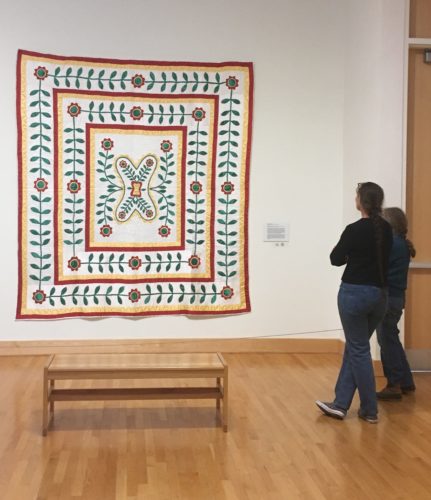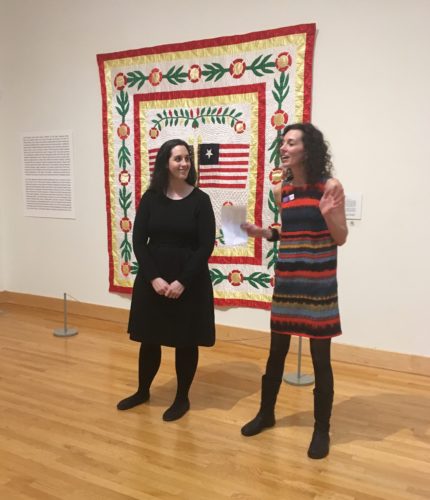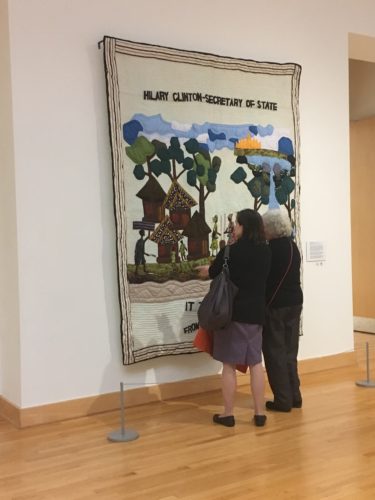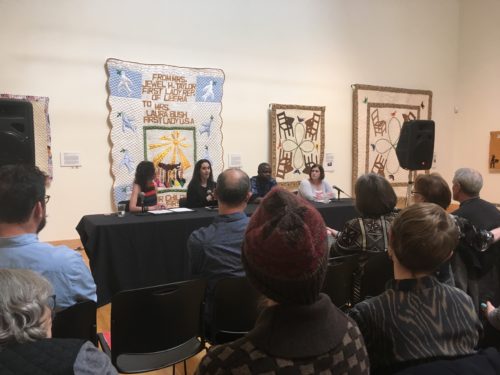
Two visitors at the Bardo Arts Museum appreciate a Liberian-made diplomatic quilt. Photo by Yustin Riopko.
“There are two kinds of power that states can have,” explained Dr. Jennifer Schiff, professor and international studies director at WCU.
“States can either have hard power or soft power. Hard power in international relations is the use of military force or economic sanction. Soft power is the power of persuasion – sharing your cultural values and traditions with the world in order to convince them that you have worthy and noble intentions.”
What better medium could you use to convince the world that you have gentle intentions than a decorative bedspread?
Soft Diplomacy is the title of an exhibit currently on display in the Bardo Fine and Performing Arts Center. The exhibit showcases a collection of quilts that were commissioned and then handmade by women from coastal Liberia and gifted from Liberia to U.S. political officials. The quilts act both as art pieces and windows into Liberian culture.
The story of how the exhibit came together and found itself at Western Carolina University is an interesting series of coincidences.

Curator Dr. Stephanie Beck Cohen (left) and Fine Art Musuem Director Denise Drury Homewood (right) deliver a gallery talk about each piece in the collection. Photo by Yustin Riopko.
In 2014 Tom Ashcraft, an artist from Washington D.C. and partner in Workingman Collective, was working on a project commissioned by the Art in Embassies program connected to the U.S. Department of State. At the embassy in Monrovia (the capital of Liberia) Ashcraft met Dr. Stephanie Beck Cohen, who was doing dissertation research for an Andrew W. Mellon Foundation fellowship.
Once the two noted the similarities in their projects, they decided it would only be logical to collaborate, and the idea was hatched for Soft Diplomacy.
Quilts were borrowed and brought together from presidential libraries and private collections that fit the mold of cultural diplomacy. The pieces in the gallery are gifts from Liberian officials to American leaders and artistic cultural representations of Liberian history and ideals.
In 2016 when Ashcraft moved from George Mason University to Western Carolina University, where he is now a professor and the M.F.A. director, he brought the idea and connections with him for the Soft Diplomacy exhibit.
The noteworthy coincidences don’t stop there. Yet another interesting fortuity is the historical tie between western North Carolina and the country of Liberia.

Two museum visitors examine a piece in the exhibit that was given to Hillary Clinton as a diplomatic gift. Photo by Yustin Riopko.
The African country of Liberia was actually founded by freed slaves who moved from the United States to Africa. After Cohen and Ashcraft brought the idea for Soft Diplomacy to WCU, they realized the specific relationship between the Tolbert House, a plantation in Cashiers, and the Republic of Liberia.
“The Tolbert slaves, when they were manumitted and sent to Liberia, kept the Tolbert name,” explained Cohen. “The Tolbert family became a really important and prominent political family in Liberia, and the quilt [in the exhibit] from the Jimmy Carter collection was actually a gift from [1970’s Liberian] president Tolbert.”
“It’s an amazing coincidence that kind of feels like it was meant to be,” she commented.
Cohen thinks the connection between Liberian quilting and western North Carolina extends even beyond this this historical coincidence, and she noted that North Carolina has a rich tradition in quilting that’s visible in our area’s local quilt guilds. Ashcroft agrees.
“In this Appalachian region, quilting has such a great tradition,” Ashcraft pointed out. “It’s one of those things where you maybe can’t articulate all the reasons but, man, it just makes sense!”

(Left to right) Denise Drury Homewood, Dr. Stephanie Beck Cohen, Dr. Saheed Aderinto, and Dr. Jennifer Schiff deliver a panel discussion on the exhibit and cultural diplomacy. Photo by Yustin Riopko.
Soft Diplomacy opened in January and will pack up on May 5. In case you missed the reception and panel on Feb. 9, there are still two more events coming up that can give you some insight on the exhibit.
On Wednesday, March 22, there will be a panel in BAC 130 called “Why Art Matters”, where the members of Workingman Collective and Art in Embassies Curator Sara Tanguy will discuss some of the pieces from the exhibit and the significance of cultural diplomacy.
On Thursday, March 23, Tanguy will be giving another talk in the same room called “Building Bridges, Creating Dialogues.”



